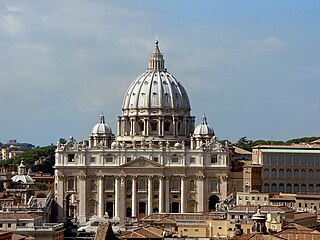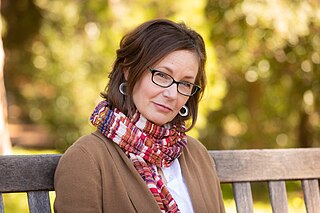Related Research Articles

The Book of Joshua is the sixth book in the Hebrew Bible and the Old Testament, and is the first book of the Deuteronomistic history, the story of Israel from the conquest of Canaan to the Babylonian exile. It tells of the campaigns of the Israelites in central, southern and northern Canaan, the destruction of their enemies, and the division of the land among the Twelve Tribes, framed by two set-piece speeches, the first by God commanding the conquest of the land, and, at the end, the second by Joshua warning of the need for faithful observance of the Law (torah) revealed to Moses.
The deuterocanonical books, meaning "Of, pertaining to, or constituting a second canon," collectively known as the Deuterocanon (DC), are certain books and passages considered to be canonical books of the Old Testament by the Catholic Church, the Eastern Orthodox Church, the Oriental Orthodox Churches and the Assyrian Church of the East, but which modern Jews and Protestants regard as apocrypha.

Deuteronomy is the fifth book of the Torah, where it is called Devarim and the fifth book of the Hebrew Bible and Christian Old Testament.
The Old Testament (OT) is the first division of the Christian biblical canon, which is based primarily upon the 24 books of the Hebrew Bible, or Tanakh, a collection of ancient religious Hebrew and occasionally Aramaic writings by the Israelites. The second division of Christian Bibles is the New Testament, written in Koine Greek.

Dei verbum, the Second Vatican Council's Dogmatic Constitution on Divine Revelation, was promulgated by Pope Paul VI on 18 November 1965, following approval by the assembled bishops by a vote of 2,344 to 6. It is one of the principal documents of the Second Vatican Council.
Biblical inerrancy is the belief that the Bible "is without error or fault in all its teaching"; or, at least, that "Scripture in the original manuscripts does not affirm anything that is contrary to fact". Some equate inerrancy with biblical infallibility; others do not.
The Deuteronomist, abbreviated as either Dtr or simply D, may refer either to the source document underlying the core chapters (12–26) of the Book of Deuteronomy, or to the broader "school" that produced all of Deuteronomy as well as the Deuteronomistic history of Joshua, Judges, Samuel, Kings, and also the Book of Jeremiah. The adjectives "Deuteronomic" and "Deuteronomistic" are sometimes used interchangeably; if they are distinguished, then the first refers to the core of Deuteronomy and the second to all of Deuteronomy and the history.

Biblical archaeology is an academic school and a subset of Biblical studies and Levantine archaeology. Biblical archaeology studies archaeological sites from the Ancient Near East and especially the Holy Land, from biblical times.
In Christian communities, Bible study is the study of the Bible by people as a personal religious or spiritual practice. In many Christian traditions, Bible study, coupled with Christian prayer, is known as doing devotions or devotional acts. Many Christian churches schedule time to engage in Bible study collectively. The origin of Bible study groups has its origin in early Christianity, when Church Fathers such as Origen and Jerome taught the Bible extensively to disciple Christians. In Christianity, Bible study has the purpose of "be[ing] taught and nourished by the Word of God" and "being formed and animated by the inspirational power conveyed by Scripture".

Catholic Theological Union (CTU) is a Catholic graduate school of theology in Chicago, Illinois. It is one of the largest Catholic graduate schools of theology in the English-speaking world and trains men and women for lay and ordained ministry within the Catholic Church. CTU is run and staffed by religious and lay men and women. International students constitute nearly one third of the student body.
There is much disagreement within biblical scholarship today over the authorship of the Bible. The majority of scholars believe that most of the books of the Bible are the work of multiple authors and that all have been edited to produce the works known today. The following article outlines the conclusions of the majority of contemporary scholars, along with the traditional views, both Jewish and Christian.
Gerald "Gary" Neil Knoppers was a professor in the Department of Theology at University of Notre Dame. He wrote books and articles regarding a range of Old Testament and ancient Near Eastern topics. He is particularly renowned for his work on 1 Chronicles, writing I Chronicles 1 – 9 and I Chronicles 10 – 29, which together comprise a significant treatment of the work of the Chronicler. In May 2005 the Canadian Society of Biblical Studies granted the R. B. Y. Scott Award to Knoppers for his two-volume Anchor Bible commentary on I Chronicles
Studium Biblicum Franciscanum (SBF), Latin for 'Franciscan Biblical Studies', is a Franciscan academic society based in Jerusalem. It is a center of biblical and archaeological research and studies, established by the Franciscan Custody of the Holy Land.
The Old Testament is the first section of the two-part Christian biblical canon; the second section is the New Testament. The Old Testament includes the books of the Hebrew Bible (Tanakh) or protocanon, and in various Christian denominations also includes deuterocanonical books. Orthodox Christians, Catholics and Protestants use different canons, which differ with respect to the texts that are included in the Old Testament.

The term Catholic Bible can be understood in two ways. More generally, it can refer to a Christian Bible that includes the whole 73-book canon recognized by the Catholic Church, including some of the deuterocanonical books of the Old Testament which are in the Greek Septuagint collection, but which are not present in the Hebrew Masoretic Text collection. More specifically, the term can refer to a version or translation of the Bible which is published with the Catholic Church's approval, in accordance with Catholic canon law.
Paul John Achtemeier was Herbert Worth and Annie H. Jackson Professor of Biblical Interpretation Emeritus at Union Theological Seminary in Virginia, now Union Presbyterian Seminary in Richmond, Virginia. He was born in Lincoln, Nebraska in 1927.
A biblical canon is a set of texts which a particular Jewish or Christian religious community regards as part of the Bible.

2 Kings 20 is the twentieth chapter of the second part of the Books of Kings in the Hebrew Bible or the Second Book of Kings in the Old Testament of the Christian Bible. The book is a compilation of various annals recording the acts of the kings of Israel and Judah by a Deuteronomic compiler in the seventh century BCE, with a supplement added in the sixth century BCE. This chapter records the events during the reign of Hezekiah and Manasseh, the kings of Judah.
Patrick William Skehan was an American Old Testament semitic scholar.

Sandra L. Richter is an Old Testament scholar, author, international speaker, and professor, who currently holds the Robert H. Gundry Chair of Biblical Studies at Westmont College in Santa Barbara, California. Her areas of specialization include Environmental Theology, Hebrew Language, Deuteronomy, the Deuteronomistic History, and the intersection between Syro-Palestinian Archeology and the Bible.
References
- 1 2 "Leslie J. Hoppe, OFM". Catholic Theological Union. Catholic Theological Union Faculty. Retrieved 2 November 2018.
- ↑ Registration deadline for Holy Land pilgrimage extended to Oct. 6, US Catholic Magazine. Retrieved 21 August 2018. Link
- ↑ Meier, John P. A Marginal Jew: Rethinking the Historical Jesus, Volume V: Probing the Authenticity of the Parables. Yale University Press, 2009: pg. 330.
- ↑ The Gospel Truth. Retrieved 21 August 2018.
- ↑ A primer on the Old Testament. Retrieved 21 August 2018.
- ↑ ‘Dei Verbum’ ‘Moved the Bible to the Center of Catholic Life’
- ↑ Fiensy, David A. Insights from Archaeology. Fortress Press, 2017: pg. 31.